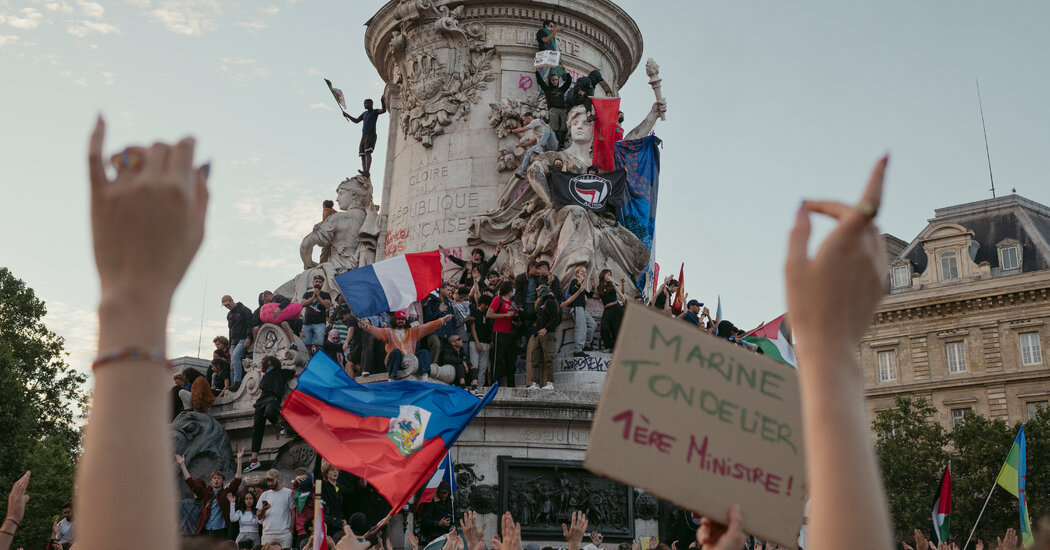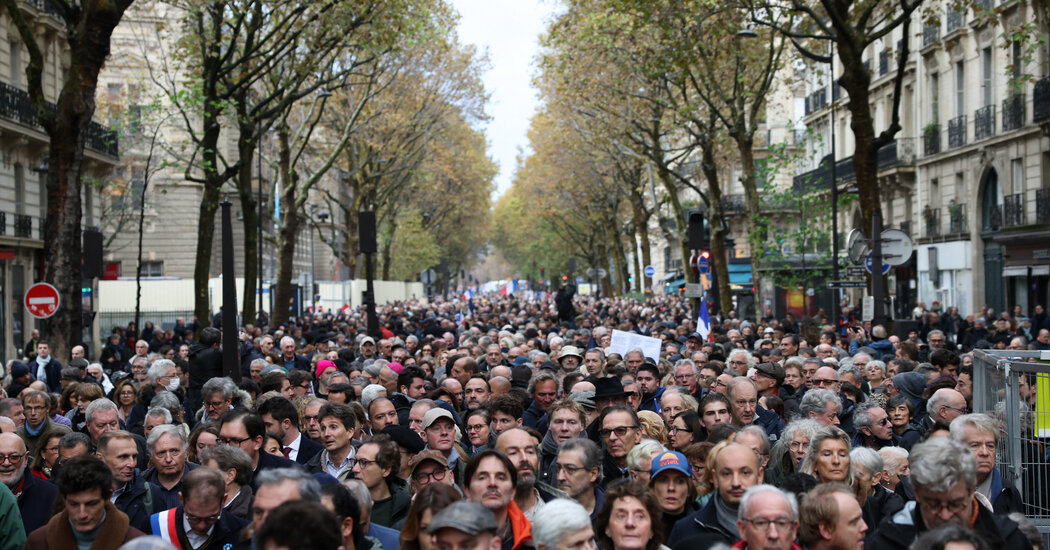“And now, what do we do?” blared the front page headline of Le Parisien, a daily newspaper, as the shock of Sunday’s election results began to sink in.
The day after a historic election, France awoke to final results that none of the polls had predicted. The left-wing coalition’s New Popular Front took the most seats in the National Assembly, but nowhere near enough to form a government, followed by President Emmanuel Macron’s centrist coalition, which lost scores of seats. Finally, in third place, was the party that pollsters and pundits alike had expected to lead — the far-right National Rally.
Now the question gripping the country was who would govern France, and how.
In a country with little taste for political compromise and collaboration, it is unclear how a government can be formed and take on the important work of passing the country’s budget and enacting new laws.
The president called the snap election a month ago, after the Euroskeptic far right walloped his pro-European party in the elections for the European Parliament. The domestic vote, Mr. Macron had explained, would offer a “clarification” for the country. Put simply, he was asking his fellow countrymen if they could really allow the far right into power when so many consider its views a danger to society.
In the end, the answer seemed to be that many could not envision that scenario. That included the left-wing parties and some of Mr. Macron’s centrists, who came together to form a so-called dam against the National Rally by withdrawing scores of candidates in three-way races.
Still, the country seemed more muddled than before, with three big political blocs, each with a vastly different vision and plan for the country. The electoral map showed enduring divisions — with Paris and its suburbs voting for the left and center, and the regions in the far north and south along the Mediterranean voting for the far right.
Le Parisien summed up the state of affairs this way, in the coda to its editorial: “When the clarification plunges into the thickest fog.”
The country was mired in “the biggest confusion,” announced an editorial in the conservative daily Le Figaro. “The National Assembly of tomorrow will be more ungovernable than yesterday’s.”
The editorial vowed to readers to “chart a path in the fog of this crisis without end.”
Prime Minister Gabriel Attal, from Mr. Macron’s party and once a favorite of the president’s, offered his resignation Monday morning, but Mr. Macron asked him to stay on for the time being “to ensure the country’s stability,” the Élysée Palace said.
“Everything is possible and everything is imaginable,” said Jean-Philippe Derosier, a professor of public law at the University of Lille, who was interviewed at length on a special radio program dedicated to the election on France Info in the morning.
Much of the country was in shock. Going into the election, all of the polls had suggested that the far-right National Rally was poised to win the most seats. The question was whether it would win enough to assemble an absolute majority and take over both the prime minister’s office and cabinet appointments.
“The flip — a spectacular reversal,” read the headline of an editorial in La Croix, a Catholic daily.
To some, the results seemed a clear rejection of the National Rally’s anti-immigration ideology, even though the party and its allies made big electoral gains, securing about 140 seats, about 50 more than the National Rally had before.
The front page of the business daily Les Echos was covered by a large photograph of the party’s president, Jordan Bardella, with the short biting headline: “The slap.”
The sense of relief and joy in the country’s capital — which blocked out the far right — was palpable.
People thronged into the city’s perennial place of protest, the Place de la République. They danced, they hugged, they congratulated one another. Fireworks exploded overhead.
“I am relieved,” said Charlotte Cosmao, 33, a set designer, who was at the edge of the square drinking a celebratory beer with a friend. “I am happy.”
In a different Place de la République 140 miles southwest of Paris in the city of Le Mans, a smaller celebration occurred. The region had also blocked the far right from getting any seats. One of the defeated candidates was Marie-Caroline Le Pen, a daughter of Jean-Marie Le Pen, a founder of the party. (Another daughter, Marine Le Pen, is a longtime leader of the National Rally, and won her seat outright in the first round of the election.)
“It’s unbelievable and completely unexpected,” Damien Fabre, 36, a history teacher, said at the celebration in Le Mans, while someone nearby screamed that there were no fascists in the region to a chorus of cheers. “It changes the whole political future of this country.”
“We were beginning to get used to the idea of having a relative majority for the National Rally,” said Mr. Fabre, who was involved in the campaign of a candidate for the far-left France Unbowed party. “Now a way for the left has opened: though it may not be able to implement its platform, at least it will be able to be in an offensive position and set the pace.”
Though the night ended with some confrontations on the streets with the police in parts of the country, the vote did not give way to a surge of violence that many, including the interior minister, anticipated. Some 30,000 police officers had spread across the country — 5,000 in and around Paris, where the far right is particularly unpopular and where the authorities worried that protests might turn violent if it won. Many shop owners in the city had boarded up their storefronts along the capital’s most famous street, the Champs-Élysées, expecting looting and riots that did not happen.
Among supporters of the far right, many drawn to its promises of tax relief, less immigration and increased state services, there was clear disappointment.
“They call us fascists, but that doesn’t exist anymore,” Claire Marais-Beuil, a newly elected National Rally politician, said at her small victory party in a local cafe in Beauvais, in northern France.
“I’m worried for my France,” she added. “It’s going to become ungovernable, and all of the things that we wanted to do will be blocked or difficult.”
There was also a question of whether the left’s win was more a rejection of the far right than an endorsement of the left-wing coalition’s platform. The newly formed coalition had called on voters last week to help it form a barrier — the “dam” or “Republican front” — against the surging National Rally to keep it from power. It even pulled 130 of its candidates from three-way races and threw its support behind opponents to beat the National Rally.
The left-leaning Libération newspaper’s editorial gave credit to the left for defeating what it termed a xenophobic right. The editorial began: “Thanks to whom? Thanks to the Republican Front.”
But that vote, it said, obliged the left-wing New Popular Front to “live up to the maturity of voters.” The editorial asked the coalition to be humble, tone down its partisanship and address many voters’ deep feelings of downward mobility — déclassement in French — that feed the far right.
Do not forget, it tells the left’s leaders, that the “extreme right is more powerful than ever in our country.”
Liz Alderman contributed reporting from Beauvais, France; Ségolène Le Stradic from Le Mans, France; and Aida Alami from Paris.




